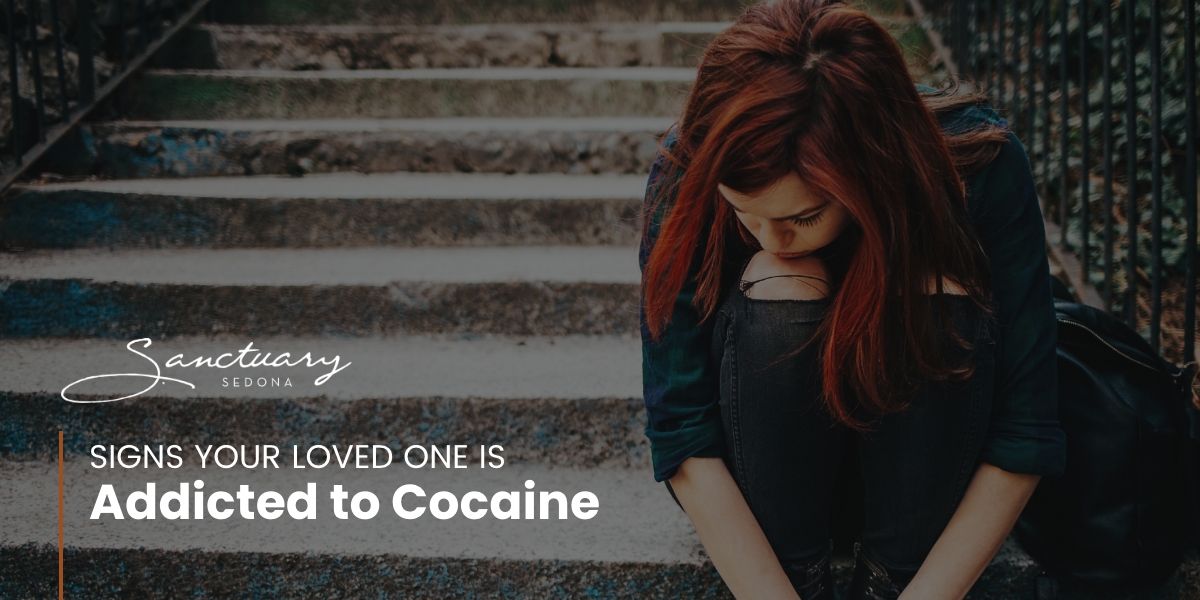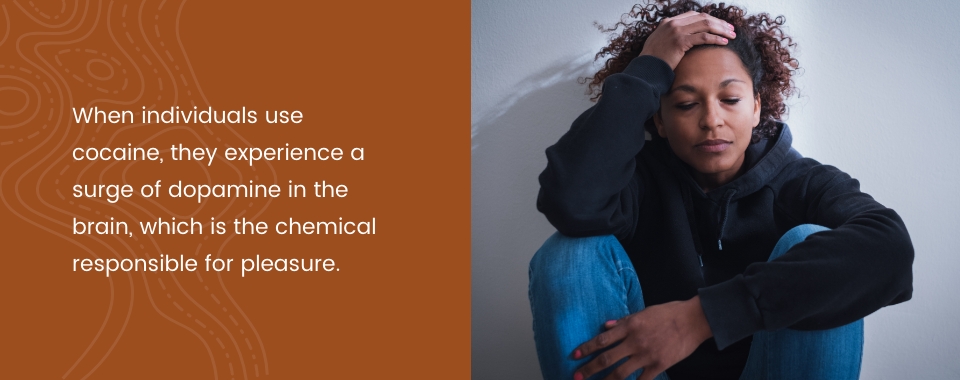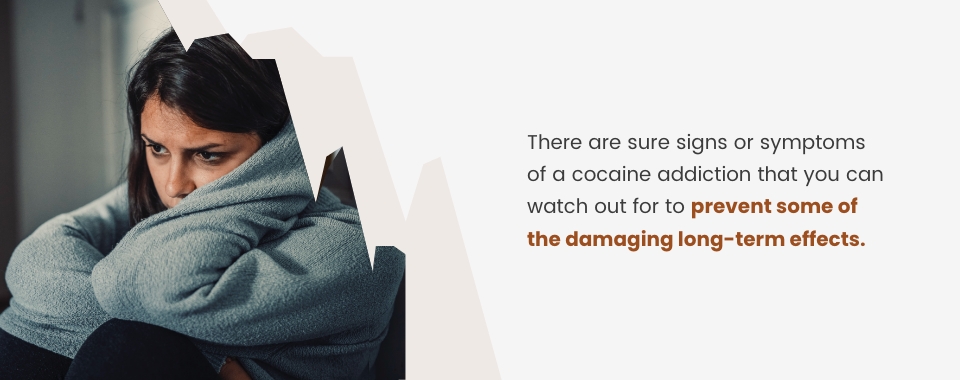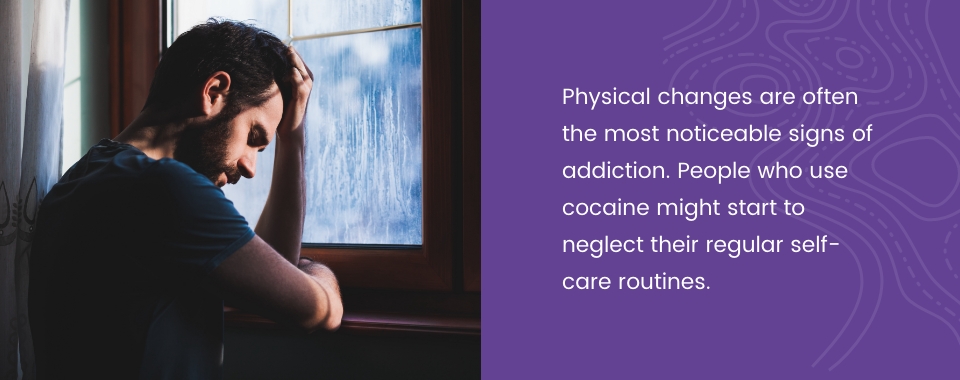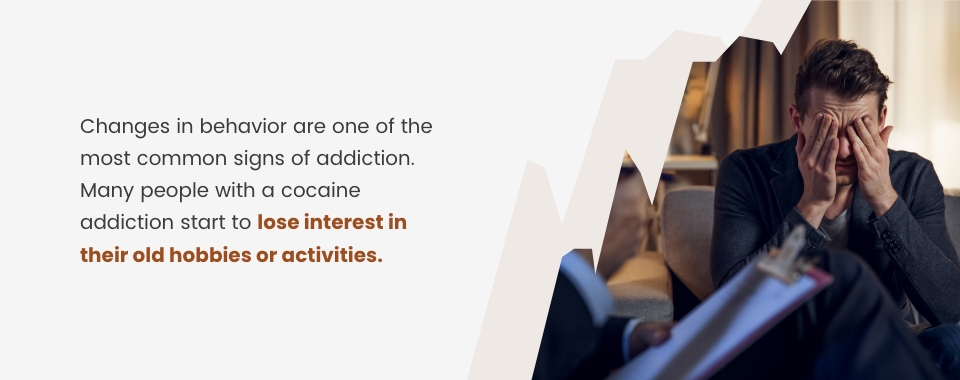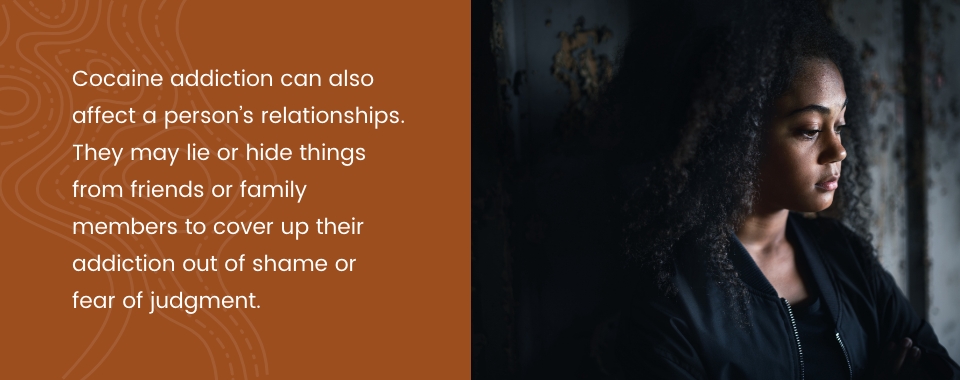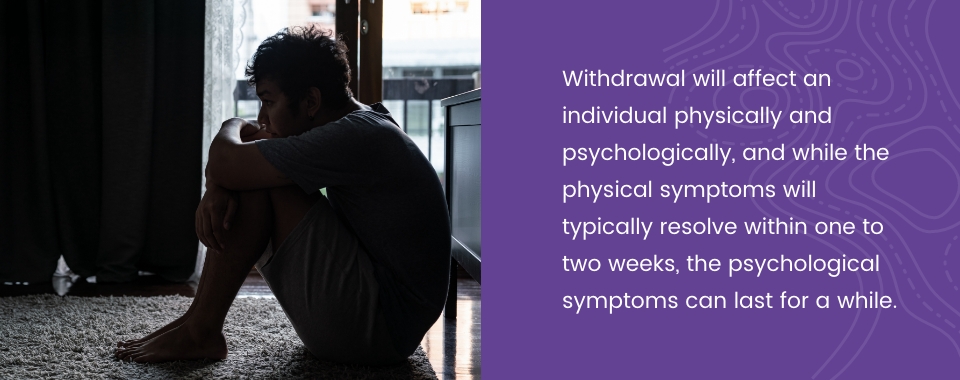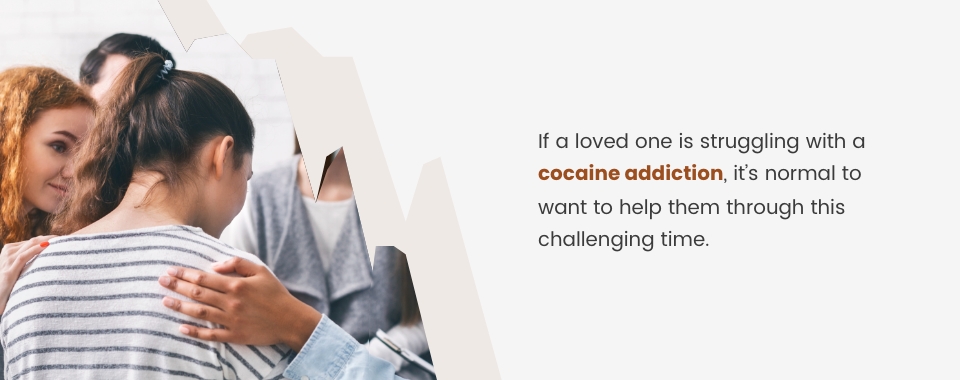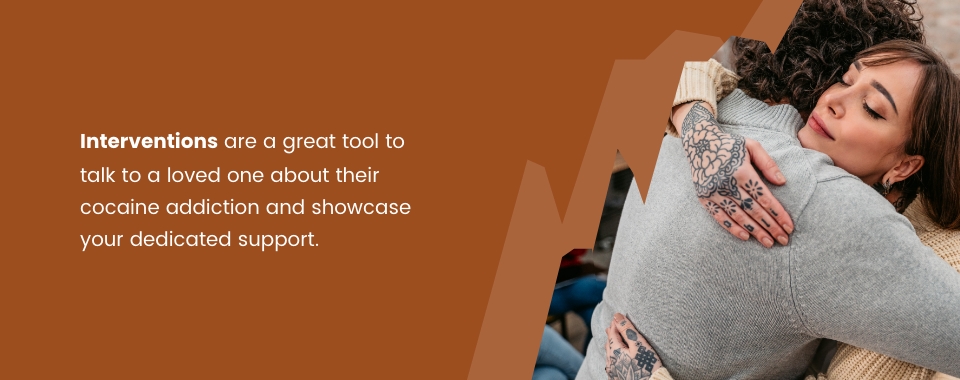Addiction can take a major toll on a person and their friends and family. Cocaine addiction affects approximately 1.4 million people across the United States and can contribute to various physical, mental and emotional conditions. If you suspect a loved one is struggling with cocaine addiction, understanding how cocaine affects the body and how to spot the signs is key to finding the proper addiction treatment and facilitating a successful recovery.
Below, we’ll guide you through the effects of cocaine on the body, how it alters the mind, how you can spot these signs in a loved one and what you can do to help find them treatment.
Learn About Our Cocaine Addiction Program
What Is Cocaine?
Cocaine is a high-priced illicit drug with a high chance of addiction. Cocaine is derived from coca leaves and has stimulating effects. Doctors in the early 1900s used the drug for anesthesia and pain, but research has shown that it’s a highly addictive chemical that causes damage to the body and mind over multiple uses. Repeated use also causes physical and psychological dependence, which results in addiction.
Cocaine can be snorted, smoked or injected. The method used to use the drug changes the length of the effects. Smoking cocaine creates a faster high, but it doesn’t last nearly as long as snorting the drug.
How Does Cocaine Affect the Body?
Cocaine affects the body in multiple ways, both short and long-term. When individuals use cocaine, they experience a surge of dopamine in the brain, which is the chemical responsible for pleasure. The drug also blocks the removal of dopamine from the brain. The feeling of pleasure drives individuals to continue using the substance.
Using cocaine can cause short-term and long-term effects on the body and mind. Many of these effects result from the stimulating effect of the substance. Short-term effects of cocaine use include:
- Dilated pupils
- Elevated heart rate
- Increased blood pressure
- Upset stomach
- Headaches
- Anxiety or paranoia
- Vertigo
- Tremors or involuntary movements
- Hyperactivity and insomnia
Short-term cocaine use can cause various harmful effects, but repeated cocaine use can damage the body in multiple ways. These effects impact areas such as:
- The cardiovascular system: Long-term cocaine use can cause an irregular heartbeat, blood clots, clogged arteries and high blood pressure. People who use cocaine for a long time also experience a higher risk of a heart attack.
- The gastrointestinal system: Many people are unaware of the effect that cocaine can have on the gastrointestinal system. This includes constipation, nausea, vomiting and abdominal pain. Since cocaine is a stimulant, it also decreases appetite, resulting in weight loss.
- The respiratory system: If a person snorts or smokes cocaine, it directly affects the respiratory system. Some of the effects include shortness of breath, coughing, coughing up blood, swelling in the lungs or infection. People who have preexisting respiratory conditions, such as asthma, will aggravate these conditions by using cocaine. The symptoms of their condition may worsen, and additional problems can also appear.
- The central nervous system: Long periods of cocaine use can seriously affect the brain. It damages the brain structure and reduces its ability to produce serotonin and dopamine on its own. Long-term use can also result in hallucinations and psychosis.
Cocaine use can also affect mental health. People with mental health conditions will sometimes use substances to cope with stress and other symptoms of mental illnesses. While substance use may provide temporary relief, mental health conditions usually worsen.
Signs of Cocaine Addiction
People with substance use disorders often have clear signs of drug addiction. There are sure signs or symptoms of a cocaine addiction that you can watch out for to prevent some of the damaging long-term effects. Spotting the signs early also allows you to seek help for your loved ones so they can regain control over their lives.
Physical Changes
Physical changes are often the most noticeable signs of addiction. People who use cocaine might start to neglect their regular self-care routines. They may wash less or stop exercising or participating in other physical activities. They may neglect their hygiene and stop showering, doing their laundry or maintaining their physical appearance.
Someone who uses cocaine may also experience weight changes due to the drug’s stimulating effects. Their appetite will be suppressed so that they won’t keep up with their regular diet. Many people with substance use disorders experience malnutrition.
Other noticeable physical changes include changes in skin color, sores on the face, dilated pupils and dental problems. Other tell-tale physical signs include white power around the nose or mouth and track marks at the injection site, often on the inner arm, hands or feet.
Sleep Disturbances
Stimulants increase an individual’s alertness, making it difficult to fall asleep. Insomnia or a lack of sleep can cause various problems throughout the body. People who don’t get a regular amount of sleep might experience:
- High blood pressure
- Increased chance for diabetes
- Increased risk of heart attack
- Depression and anxiety
- A weakened immune system
- A decreased sex drive
Disrupted sleep can also affect your appearance, including dark circles under the eyes or wrinkles. Not getting enough sleep also increases cortisol levels in the body, known as the stress hormone.
Behavioral Changes
Changes in behavior are one of the most common signs of addiction. Many people with a cocaine addiction start to lose interest in their old hobbies or activities. They’ll devote most of their time to seeking and using cocaine.
It’s also common for people who use cocaine to experience mood swings, which can be severe. Long-term use can result in extreme irritability or violent outbursts. Individuals can also experience erratic behaviors, suicidal thoughts, paranoia and hallucinations. Some people who use cocaine may be attempting to self-medicate their mental health conditions, making their symptoms worse over time.
Some people may have also attempted to quit in the past but have been unable to stop. They may lack the motivation to quit, or they might not see that a problem exists.
Performance Issues
People with an addiction struggle with multiple aspects of their life. They may find it challenging to perform as expected at work or may fail to show up at work at all. They may be distracted by thoughts of their addiction or might be experiencing uncomfortable side effects of long-term use. Many people try to hide their addiction from their bosses and coworkers, which may lead them to become withdrawn.
These challenges are also present in individuals struggling with addiction and trying to get an education. Sometimes, people begin using drugs to help their academic performance, but often it leads to addiction and worsening performance. If a student is struggling with addiction, they may neglect their schoolwork.
Cocaine Addiction and Relationships
Cocaine and relationships do not mix. They may lie or hide things from friends or family members to cover up their addiction out of shame or fear of judgment. Often, they’ll neglect their relationships and withdraw or stop contacting loved ones altogether. They also might not maintain their responsibilities, such as helping out around the home or paying their bills. Relationship tension can cause individuals who struggle with addiction to continue using cocaine as a way to cope.
Criminal or Finacial Trouble
There is a correlation between drug use and crime. Some people with an addiction commit crimes to get money for drugs. Others may commit violent crimes due to their drug use since cocaine can increase irritability and the chance for violent outbursts.
In addition to crime, cocaine addiction can cause financial problems. A person may spend excessive money to get the drug, especially since cocaine is one of the most expensive street drugs. People may even spend money they don’t have, leading to debt. The additional stress can increase the risk of drug use.
What Are Common Withdrawal Symptoms With Cocaine Use?
Someone who stops using cocaine will experience various withdrawal symptoms. Withdrawal will affect an individual physically and psychologically, and while the physical symptoms will typically resolve within one to two weeks, the psychological symptoms can last for a while. However, there are tools to manage these symptoms to make recovery more comfortable.
The severity of cocaine withdrawal symptoms depends on the amount used during the period of use. Some of the common withdrawal symptoms include:
- Exhaustion and fatigue: Cocaine is a stimulant, meaning that it keeps you awake and alert while it’s in your system. However, once the body detoxifies from the substance, a person might experience intense exhaustion or fatigue as they start to adjust to the absence of the drug. When cocaine is no longer present to keep them awake, their body will feel more tired as it begins the healing process.
- Anhedonia: This is a symptom where an individual experiences the inability to feel pleasure. When someone is coming down from cocaine or detoxing, their ability to produce serotonin and dopamine is impacted, so they may not feel pleasure until their body can produce enough of the pleasure and happiness hormones.
- Difficulty concentrating: Cocaine muddles the hormones in the brain, and a person going through detox might have trouble focusing or thinking clearly as a result. The individual might describe their thinking patterns as slowed while their body and mind heal from cocaine use.
- Depression and anxiety: Withdrawal from cocaine can alter a person’s mood as the hormones in their body fluctuate and rebalance. They may experience depression and anxiety while detoxing from the substance. Additional feelings of depression and anxiety may arise due to a lack of access to the substance since their bodies will still crave the drug.
- Cravings: When a person stops using a substance, they’ll experience cravings, which are urges to use it again. Cravings can also appear after exposure to triggers. Triggers are things or situations that influence someone to use a substance. This can include stress, peer pressure, loneliness or depression.
- Body aches and pain: Pain is a common withdrawal symptom because cocaine can impact the body’s ability to produce endorphins. Without our natural painkiller, a person might experience more aches and pains while detoxing from a substance. Other withdrawal symptoms can also cause pain or fatigue in the body. The aches and pains might be worse if the cocaine use was severe. Tremors and chills caused by withdrawal can also contribute to body pain.
- Increased appetite: The stimulating effects of cocaine suppress the appetite while being used. Once the drug leaves the body and detox begins, an individual might feel an increase in their appetite. They’ll likely start eating more than they did when using and might begin to gain back the weight they had lost.
- Nightmares or other sleep disturbances: Some withdrawal symptoms, such as depression and anxiety, can contribute to sleep disturbances during the withdrawal process. The stress from the withdrawal can also cause additional problems during the night.
Withdrawals from cocaine don’t typically require medical intervention, despite the uncomfortable feelings they may cause. Overcoming the physical withdrawal symptoms is a significant step towards recovery.
How to Help a Friend With Cocaine Addiction
If a loved one is struggling with a cocaine addiction, it’s normal to want to help them through this challenging time. Someone with a cocaine addiction may be unaware that a problem exists, making it difficult to understand that intervention is necessary. Friends, family members and other loved ones can help this person realize that they need help.
Loved ones should recognize that a person with a cocaine addiction will have triggers that cause cravings, such as trauma, mental health conditions and stress. Analyze the factors in your loved one’s life to determine what could be contributing to their cocaine addiction. Addressing these factors can help your loved one understand their addiction and motivate them to take the necessary steps to get help.
Some of the other ways you can help your loved one with their cocaine addiction include:
- Educating yourself: It’s essential to have a clear understanding of what cocaine is doing to your loved one. You should research how substance use affects the body, mind and personal relationships and come equipped with this knowledge when you start a conversation.
- Be patient yet persistent: Some individuals struggle with admitting to their addiction, and they may experience relapses or setbacks. Be patient and understanding, but don’t give up. Continue being persistent about getting your loved one help.
- Offer your support: Make it clear that you don’t support cocaine use, but you support the person. Your loved one should feel like they can rely on them for help and that you aren’t judging or shaming them for their addiction.
- Set boundaries: While offering support is important, it’s also essential to set clearly defined boundaries. Make it clear that you don’t support their cocaine use and implement the necessary boundaries to make this evident, such as refusing to let them use in your home or withholding money that you know they’ll use for cocaine. Uphold these boundaries, so your loved one knows that you’re serious.
Staging an Intervention for Cocaine Addiction
Interventions are a great tool to talk to a loved one about their cocaine addiction and showcase your dedicated support. An intervention is generally a meeting between friends, family members and other loved ones. The meeting is planned without the knowledge of the addicted individual. Since some people with cocaine addiction cannot readily admit that a problem exists, a surprise intervention helps them confront their addiction without being given a chance to avoid the meeting.
You don’t have to wait until your loved one has reached the proverbial “rock bottom.” Interventions can happen at any stage of addiction. The goal of an intervention is to motivate your loved one to ask for help and seek treatment when they need it. If you’re worried that your loved one might react aggressively or if they’re prone to violent outbursts as a result of their cocaine addiction, seek out professional advice. They can help guide you through the process to avoid a reactive confrontation.
As you prepare for the intervention, have everyone write down instances where cocaine addiction has harmed the personal relationships with your loved one. Be careful to only use “I” statements, so the intervention doesn’t come off as aggressive or confrontational. Offering your continued support is key, but state clear consequences that will happen if your loved one doesn’t seek help and don’t hesitate to follow through if necessary.
It’s also a good idea to set up treatment options ahead of time. Get in touch with a treatment facility or other professionals to arrange care once the intervention has ended. If everything goes according to plan, your loved one should feel motivated to start treatment. Arranging their treatment for them can also prevent any additional stress that might prevent them from starting their recovery journey.
Why Holistic Treatment Is the Best Treatment for Cocaine Addiction
Many treatment facilities focus on medication-assisted treatment and don’t focus on the underlying issues contributing to cocaine addiction. The use of 12 step programs also focuses on the idea that addiction is a lifelong disease prone to relapses.
A holistic approach focuses on a person’s well-being rather than just their condition to encourage recovery and prevent relapse-realted fear. It aims to look at the person as a whole, including their physical, mental and emotional needs. Holistic treatment for cocaine addiction seeks to empower individuals and show them that they can make positive changes in their lives.
Our brains can heal from the effects of cocaine. Holistic treatment can help people with cocaine addiction create new neural pathways that heal the mind, body, spirit and soul. Once this healing is complete, your loved one will no longer be consumed by thoughts of cocaine or experience fear from relapse. They’ll live a life of wellness and emerge as the best versions of themselves.
Some of the holistic healing treatments include:
- Meditation
- Yoga
- Supplements
- Mental activities
- Organic nutrition
Energy medicine is another popular holistic treatment for cocaine addiction. This method focuses on the trauma within our subconscious. Trauma and associated feelings hold a “charge” that influences our emotions and contributes to addiction. Holistic treatment drains these charges through various techniques, such as acupuncture. Once these charges are drained, a person is more willing to make positive changes, and therapy becomes more effective.
Holistic treatment can help your loved ones reconnect with themselves and create healthy habits that make cocaine undesirable. The personal transformation will balance their lives, and their entire system, including the mind, body, spirit and soul, will benefit.
Contact The Sanctuary at Sedona to Speak With a Counselor About Treatment Options
The Sanctuary at Sedona uses holistic treatment methods alongside western medicine to provide our clients with the best care possible. We’ve been treating addiction for over 10 years with new and effective treatment strategies to heal every part of an individual, giving them a new lease on life. Much of our staff live on campus and has dedicated their life to healing substance use disorders.
If you or a loved one are struggling with addiction, contact The Sanctuary at Sedona to take the first step towards wellness to heal cocaine addiction and your relationships. We’ll help you recover and treat your body, mind and soul to eliminate desires surrounding substance use. Contact us today to speak with a counselor about our various treatment options.

